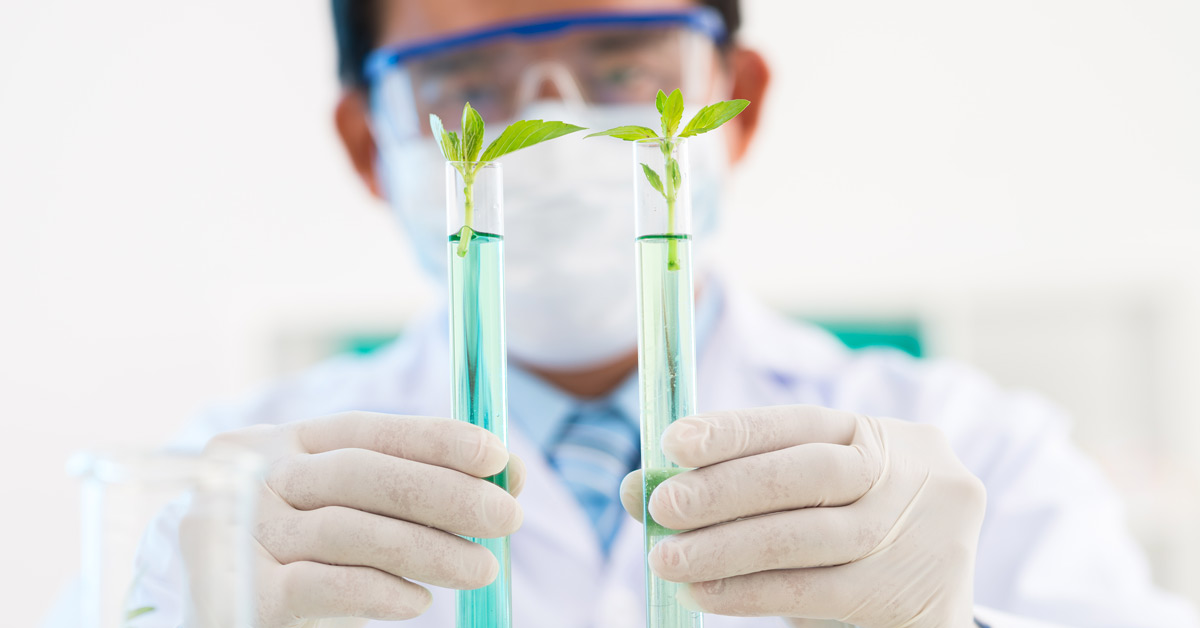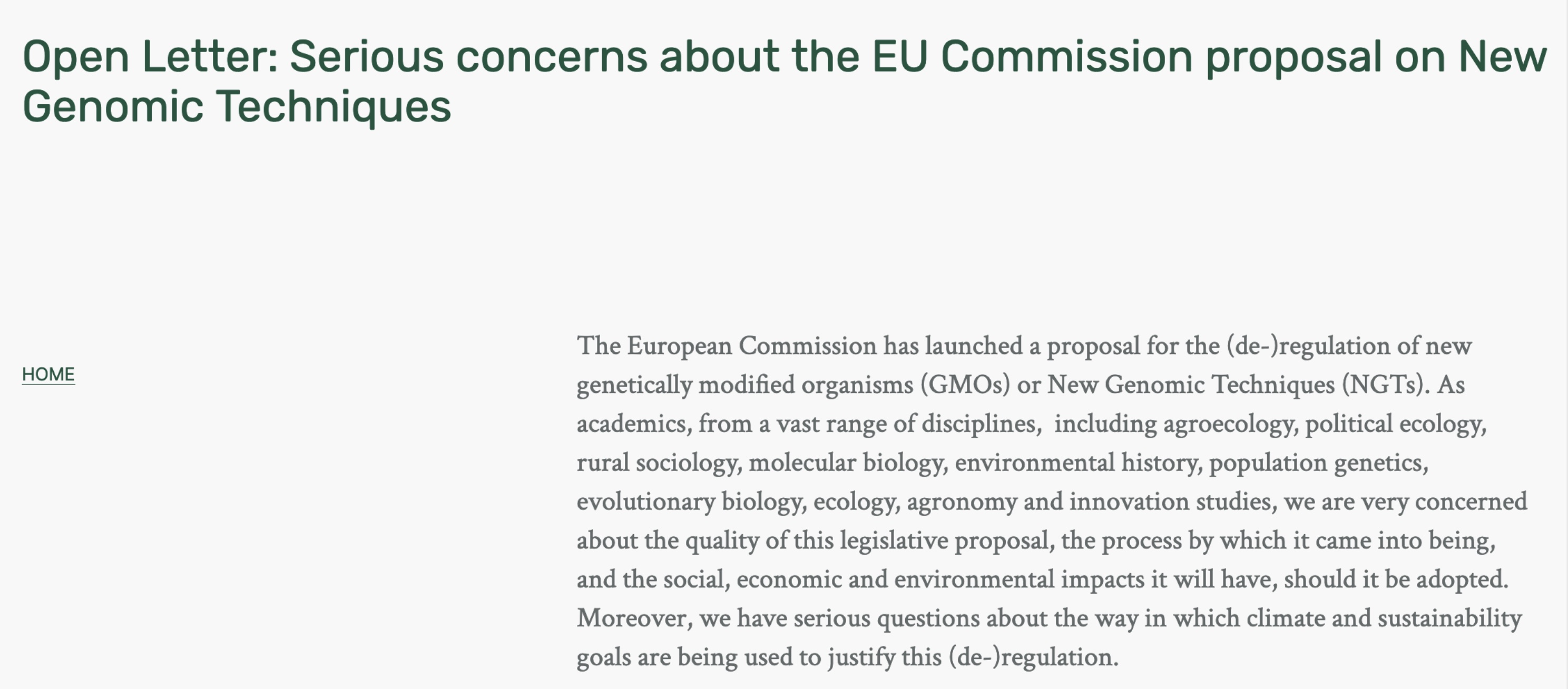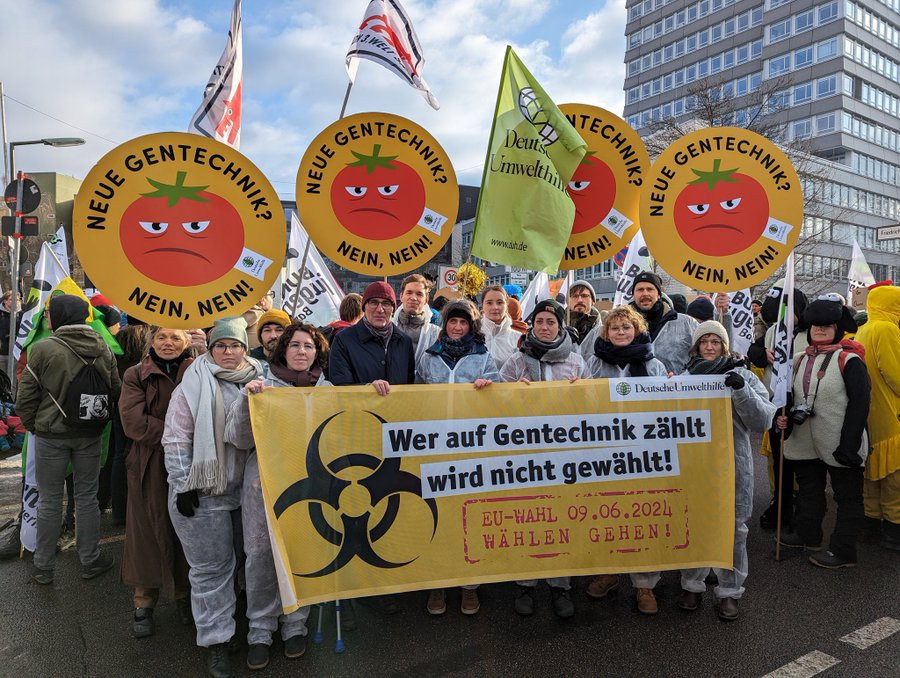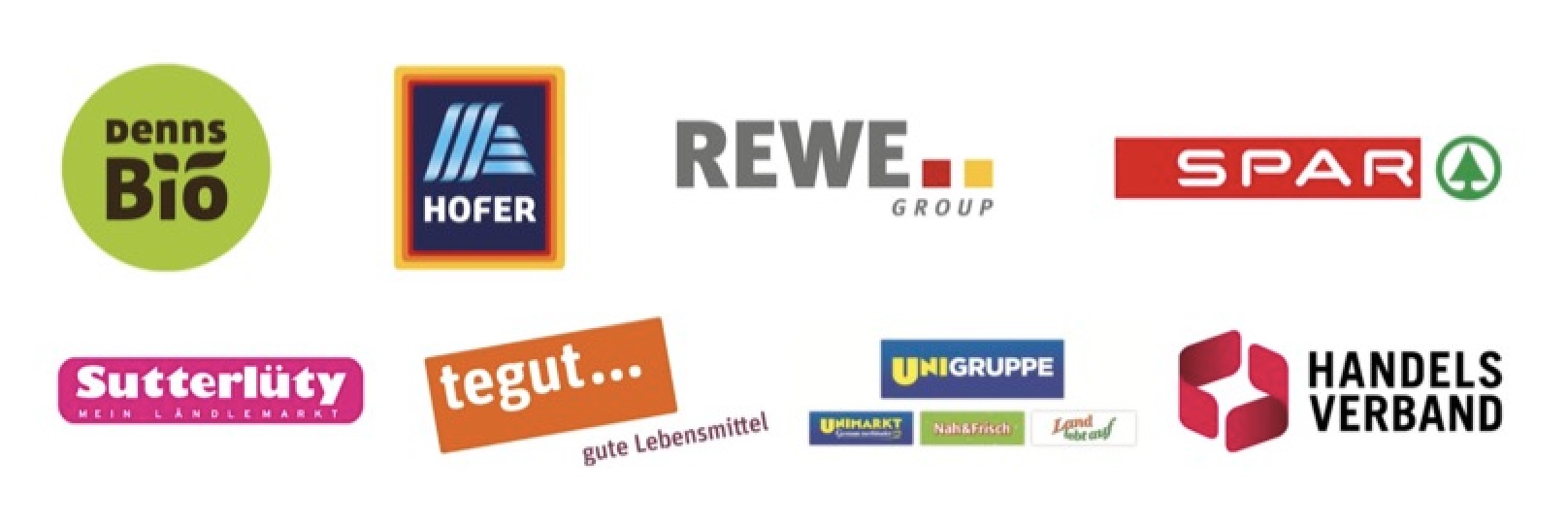Bayer, BASF lobby pushed to scrap safety rules on new GM crops – even if they increase pesticide use
Disclosed lobby documents show that the European Commission and some MEPs jumped to obey industry’s orders in designing a GMO deregulation law that will harm health, biodiversity, and farmers. The documents show that even in the last days before publication of the Commission’s final proposal on 5 July, it had been changed to weaken it even further and push GM herbicide-tolerant (HT) crops into European fields – in line with the wishes of these same corporations. Indeed, while industry was pushing the deregulation of new GMOs with the claim that they would help to reduce pesticide use, at the same time their misleading lobby campaign led to the derailing of the pesticide reduction law (SUR). The lobby documents show that the EU Commission's position on new GMOs is a deceptive fix, crafted to please industry while throwing the precautionary principle to the winds.
French food safety agency ANSES demolishes Commission’s assumptions of “equivalence” for new GM plants
The French government’s food safety agency ANSES has demolished the European Commission’s proposal for a definition of a class of new GM plants (so-called Category I NGT plants) that would be exempted from risk assessment, traceability and labelling because of their supposed “equivalence… to conventional plants”. ANSES says there is no scientific basis for such an assumption of equivalence.
Webinar with French food safety authority and Prof Antoniou on lack of scientific basis for GMO deregulation proposal
The MEP Christophe Clergeau organised a webinar on 17 January with a representative of ANSES (see above) and Prof Michael Antoniou. Each of them spoke on different aspects of the lack of scientific basis for the GMO deregulation proposal. Prof Antoniou proposed amendments to the current draft of the proposal. The webinar can be viewed here. No video of the speakers was available due to technical problems but the presentations can be viewed and the entire session can be heard.
Detection of new GMOs – possible and necessary for transparency and public trust
The European Commission’s proposals for the regulation of new GMOs (products of new genomic techniques or NGTs) state that detection of these GMOs may be challenging or impossible. The Commission uses this as a reason to remove them from the requirements of the current GMO legislation – which include risk assessment, traceability, and labelling. However, this is misleading. Detection of new GMOs is possible, given prior knowledge of the relevant genetic sequence and reference materials, which can – and should – be demanded from the developer as a condition of their approval. Even without such prior knowledge, detection may be possible. GMWatch and Beyond GM have published a new briefing on this crucial topic.
Academics, scientists call to scrap gene-editing proposal
More than 70 academics and scientists signed a letter asking for a full rejection of the European Commission's proposal to deregulate new GMOs (products of new genomic techniques or NGTs), on the grounds that it threatens an “irreversible change” to our ecosystems and food systems. The letter says, “We are very concerned about the quality of this legislative proposal, the process by which it came into being, and the social, economic and environmental impacts it will have, should it be adopted. Moreover, we have serious questions about the way in which climate and sustainability goals are being used to justify this (de-)regulation.” The letter criticises the "arbitrary" and non-scientifically-based distinction between the different categories of new GM plants – the vast majority of which are planned to be exempted from safety checks, traceability, and labelling – and the lack of risk assessments. The letter adds, “The concept of safety is conspicuous by its absence in the proposal, even though it is the cornerstone of existing GMO legislation.” The letter was covered by the mainstream European magazine Politico.
Genetically modified crops aren’t a solution to climate change – academics
Biotech firms seem to have succeeded in convincing the European Commission that we need new GM crops to tackle climate change. They argue that by enhancing crops’ resistance to drought or improving their ability to capture carbon, climate change may no longer seem such a daunting challenge. If this seems too good to be true, it is, write academics Anneleen Denis and Barbara Van Dyck. They write that biotech firms have taken advantage of growing concerns about climate change to influence the European Commission with an orchestrated lobbying campaign. The firms use the terms “gene editing” or “precision breeding”, which may sound reassuring, but they are marketing terms and say nothing about the accuracy of the techniques used or their potentially negative effects. Studies have shown that new genetic techniques can alter the traits of a species to an extent that would be impossible, or at least very unlikely, using conventional breeding. They can also trigger substantial unintended changes in the genetic material of plants. But perhaps most importantly, GM plants aren’t the solution to the climate crisis.
New GMOs: Scientists oppose EU Commission proposal
A number of European scientists issued a joint statement warning against approval in the EU of plants obtained from new GM (or new genomic techniques, NGTs) that are not risk assessed. The signatories work in the fields of (among others) molecular biology, technology assessment, environmental sciences, and medicine. None of them have any economic interests linked to the development and marketing of agricultural genetically engineered organisms. The experts from Germany, Spain, Switzerland, and the UK are opposing a legislative proposal brought forward by the EU Commission, which would in future allow the environmental release of plants obtained from new genetic engineering without prior risk assessment. They point out that the proposed legislation ignores the main differences between new genetic engineering and conventional breeding as well as the associated risks.
Short video: Scientist discusses the dangers of new GMOs and their planned deregulation
What does an agronomic scientist have to say about new GMOs and their planned deregulation? Listen to a short video presentation by Dr Angelika Hilbeck from the Swiss Federal Institute of Technology. Also see other related videos from the organic sector's perspective at the link above.
The message from Berlin: No new GMOs!
Around 8000 people took to the streets of Berlin on 20 January to protest against the EU’s push to deregulate new GMOs. Farmers staged a tractor march and the demonstration culminated at the Bundestag, Germany's Parliament. Participants included Bund, NABU, Friends of the Earth, LVÖ Bayern, Greenpeace, Bioland, Four Paws and Naturland. The event was timed to coincide with the Global Forum for Food and Agriculture (GFFA) and Green Week. Around 200 farmers drove their tractors to the Green Week venue and met with Agriculture Minister Özdemir. The farmers, most of them organic, fear that the deregulation of new GMOs that is currently being negotiated in the Parliament and the Council could make their work impossible, especially given the push by some MEPs in the Parliament to remove the (minimal) remaining traceability requirements. They also condemn the expected influx of patented new GMOs into food and agriculture, which will further consolidate power into the hands of the big agricultural corporations.
EU Parliament and Council must suspend consideration of proposed new GMO deregulation – farmers’ group
At the end of 2023, two major events further called into question the proposal for new regulations on GMOs obtained using new genomic techniques (NGT), according to peasant farmers' organisation ECVC (European Coordination Via Campesina):
* The French Health and Food Safety Agency’s (ANSES) opinion denouncing the absence of scientific justification for the deregulation (see first item in this Review, above).
* The Council of the EU failed to reach any consensus on the text, with the main stumbling block being the issue of patents covering all these NGTs. Faced with this impasse, the Council and the European Parliament’s Agriculture Committee are proposing a ban on the patentability of these GMOs, which in practical terms is unenforceable under current patent law.
Farmers, green groups demonstrate against proposed GMO legislation
In early January, members of various agricultural and environmental organisations converged at Luxembourg Square, Brussels, to rally against a proposed European regulation on GMOs. The demonstration was spearheaded by Demeter VZW, a group that promotes biodynamic farming. “Agro-industry wants to take away our freedom to grow our seeds,” the group charged. It accused the EU of conducting an intense lobbying campaign to enact legislation allowing GMOs, gene technologies and New Breeding Techniques (NBT) in agriculture and the food chain. Besides Demeter, the protest was also backed by groups such as Food Otherwise, Farmers Forum, VELT, Vital Breeds, and BioForum VZW.
Germany: 139 associations call for strict regulation of genetic engineering
139 German organisations demanded strict regulation of genetic engineering in an open letter to Germany’s Minister of Agriculture, Cem Özdemir. The letter says, “The German Federation for the Environment and Nature Conservation (BUND), the German Rural Agriculture Association (AbL) and the German Federation of Organic Food Producers (BÖLW), together with the youth organisations BUNDjugend and junge AbL (jAbL), call for the preservation of freedom of choice, the safeguarding of GMO-free conventional and organic food production, transparency, the protection of natural resources, and the continued strict regulation of new genetic engineering techniques.”
New GMOs: 13 organisations alert the French President and Prime Minister to EU deregulation project
In a letter sent on 28 November 2023, thirteen agricultural and environmental organisations called on the French President and the French Prime Minister to address the risks associated with the European regulation on new GMOs. Greenpeace France said: “Negotiations on this draft regulation are accelerating for no other reason than to impose new GMOs on the European market, taking organisations and citizens by storm... This text contains elements that will structure the future of the European agricultural and food system. It will have major consequences for all citizens, and must absolutely be the subject of public debate. This draft regulation has been rejected by the majority of consumers, by farmers and by the organic sector.”
Policymakers should respect organic movement’s choice not to use NGTs
Jan Plagge, President of IFOAM Organics Europe, called on Members of the European Parliament (MEPs) and Member States to respect organic farmers and operators’ choice to not use new genomic techniques (NGTs) and maintain the ban on the use of NGTs in organic production as laid out in the Commission’s proposal. Bernard Lignon, IFOAM Organics Europe Board member and sector representative for processing and trade, called on policymakers to include full traceability on the use of NGTs in the production chain and the possibility for coexistence measures at national level in the legislative proposal. Jan Plagge said: “In June, the overwhelming majority of the European organic movement voted to remain GMO-free, as reflected in the Commission’s proposal. It would be shocking if MEPs decided to delete the ban of NGTs in organic production and impose the use of NGTs to all producers in Europe, organic or not. Exempting certain NGTs from risk assessment and traceability would have important consequences for the food production sector in Europe, much beyond the organic market, and these discussions should not be rushed.”
Agricultural and environmental organisations protest against new GMO legislation in Europe
On 29 November Dutch and Belgian farmers, farmers’ associations and environmental organisations headed to Brussels to protest against the European legislative proposal that seeks to completely deregulate new GMOs made with techniques such as CRISPR/Cas. If these plans go ahead, the freedom of choice for farmers and consumers to work and eat GMO-free will disappear. In the European Commission’s proposal, new genetic engineering techniques such as CRISPR/Cas are no longer given a risk assessment. As a consequence, they would be used freely, without any tracing or labelling. “People will no longer know whether they are getting GMOs on their plates,” said organic farmer Greet Lambrecht of the farmers' association Vitale Rassen vzw. “Even organic farmers and others, who consciously work GMO-free, will lose that freedom of choice. However, this is crucial. If Europe is serious about the growth of organic agriculture, it must offer watertight guarantees that the organic sector can continue to work GMO-free. The current proposal does not offer that guarantee.”
New GM techniques can create different genetic changes to those from conventional breeding, say scientists
New GM techniques – or NGTs, as gene editing technologies like CRISPR/Cas are being labelled – can create both intended and unintended changes in the genome that would be unlikely to occur with conventional breeding methods, including the non-targeted mutagenesis breeding methods that have been used for several decades by a minority of conventional breeders. This is the main message of a review of the scientific literature published in Frontiers in Bioengineering and Biotechnology. The authors of the review explain that the biological effects of these changes on the health of consumers and the environment might also be different from those arising from conventional breeding and may pose risks. This directly contradicts the rationale put forward by the GMO lobby to justify the deregulation of new GMOs – that the changes brought about by new GM techniques are no different to those that might be caused by conventional breeding, and so there are no novel risks that need assessing. Testbiotech commented on the study here.
Food companies: Support the right to know whether there are new GMOs in food
The German companies Alb-Gold, Alnatura, Andechser, dm and Frosta have launched an initiative to preserve labelling and freedom of choice for GM foods and they are calling on all companies from food production and trade in Europe to join them. They have written an open letter laying out their demands to Manfred Weber, the European People’s Party (EPP) Group Chairman in the European Parliament and Deputy Chairman of the German CSU (Christian Social Union, a Christian democratic and conservative political party).
Eight major German and Austrian supermarkets say consumer choice, organic must be protected from new GMOs
Eight major German and Austrian supermarkets have written an open letter to MEPs on the ENVI and AGRI committees regarding the European Commission's new GMO (new genomic techniques or NGTs) deregulation proposal, warning that they must not jeopardise:
* Consumer choice
* Organic farming, and
* Food price stability.
The supermarkets, which include Rewe and Spar, write, “According to numerous national and pan- European market surveys, a significant number of consumers are very opposed to genetically modified crops in their food. We want to continue to give these consumers full freedom of choice. To ensure this, EU regulations must guarantee full traceability and labelling of NGTs throughout the supply chain to ensure the continued existence of NGT-free and organic agriculture and food production. Binding coexistence measures... are also essential to this end.”
Food and farming business experts: UK Food Standards Agency consultation on “precision-bred” GMOs is misleading and flawed
A group of experts representing business, farming, certification, academia, science and civil society have lodged a formal complaint against the UK’s Food Standards Agency (FSA), raising serious concerns about its public consultation process on genetically modified “precision bred” organisms (PBOs). GMWatch is among the signatories. The complaint, submitted to the Agency and copied to the Department of Health and Social Care (DHSC), to whom it reports, alleges multiple abuses of Cabinet Office Consultation Principles and serious misrepresentation of the facts, which call into question the integrity of the Agency and its stated goal of transparency and truthfulness. Feed Navigator gave excellent coverage to the complaint.
Gene silencing pesticide approved in US
The US Environmental Protection Agency has approved the use of a sprayable biopesticide that relies on RNA interference (RNAi) – gene silencing technology – to combat the Colorado potato beetle. The pesticide’s active ingredient, ledprona, consists of double-stranded RNA (dsRNA). The product is the first dsRNA pesticide in the world allowed to be sprayed on plants, according to the EPA. Ledprona works by turning off a gene the Colorado potato beetle needs to produce a protein that is critical for its survival. The Massachusetts-based biotech firm GreenLight Biosciences, which makes the product, claims it specifically targets the Colorado potato beetle and is not harmful to other insects. The pesticide also breaks down rapidly in the environment, the company says. However, a scientific review by Prof Jack Heinemann and colleagues explains that there are many serious risks of dsRNA technology, including the risk of silencing the genes of non-target organisms that consume or inhale dsRNA, such as humans or other animals. Environmental groups are sounding the alarm over potential unintended consequences of the novel technology on bees and other pollinators.
Patents and new GMOs: Don’t risk the future of our seeds!
Seed savers, the GMO-free industry association ENGA, and environmental NGOs sent a statement to EU agriculture ministers on the dangers of patent applications covering new genomic techniques (new GMOs). They are concerned that the proposed deregulation of new GMOs will potentially cause an influx of patented GM seed, harming farmers' rights to save seed for replanting and restricting breeders' access to germplasm. They write, “We ask you not to push the legislative process towards a new regulation of New Genomic Techniques any further, as long as its impact on the scope of patents on seeds is not fully evaluated and corrected by political decision making. The proposal on NGTs itself and the following process ignores big controversial topics such as patents. The proposed report on the impact of the patenting of plants as part of broader market analysis by 2026 is not sufficient to tackle the issue. This would be too little, too late.”
..................................................................
We hope you’ve enjoyed this newsletter, which is made possible by readers’ donations. Please support our work with a one-off or regular donation. Thank you!
















